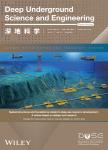High-performance computing of 3D blasting wave propagation in underground rock cavern by using 4D-LSM on TianHe-3 prototype E class supercomputer
作者机构:State Key Laboratory of Hydraulic Engineering Simulation and SafetySchool of Civil EngineeringTianjin UniversityTianjinChina
出 版 物:《Deep Underground Science and Engineering》 (深地科学(英文))
年 卷 期:2022年第1卷第1期
页 面:87-100页
核心收录:
学科分类:08[工学] 0812[工学-计算机科学与技术(可授工学、理学学位)]
基 金:National Natural Science Foundation of China Grant/Award Number:51979187
主 题:domain decomposition method lattice spring model parallel computing wave propagation
摘 要:Parallel computing assigns the computing model to different processors on different devices and implements it ***,it has broad applications in the numerical simulation of geotechnical engineering and underground engineering,of which models are always *** parallel computing,the computing time or the memory requirements will be reduced by splitting the original domain of the numerical model into many subdomains,which is thus named as the domain decomposition *** this study,a cubic and equal volume domain decomposition strategy was utilized to realize the parallel computing on the distributed memory system of four-dimensional lattice spring model(4D-LSM)based on the message passing *** a more efficient communication strategy introduced,this study aimed at operating an one-billion-particle model on a supercomputer *** preprocessing procedure of the parallelized 4D-LSM was restructured and the particle generation strategy suitable for the supercomputer platform was employed to minimize the time consumption in preprocessing and *** this basis,numerical calculations were performed on TianHe-3 prototype E class supercomputer at the National Supercomputer Center in *** fieldscale three-dimensional blasting wave propagation models were carried out,of which the numerical results verify the computing power and the advantage of the parallelized 4D-LSM in the simulation of large-scale three-dimension ***,the time complexity and spatial complexity of 4D-LSM and other particle discrete element methods were analyzed.



